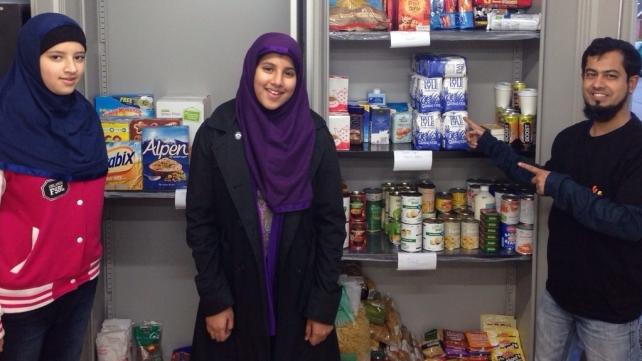
As our Masjids and Islamic centres become deserted over the next few days due to the Coronavirus pandemic, it’s a golden opportunity for community organization and Masjid boards, managements, Imams, and volunteers to think out of the box.
As physical religious and social events at Masjids are minimized, our centres of worship must evolve into centres of social service to the most vulnerable, inaccessible, and disenfranchised in our society. Let our service be not limited to our congregants or the Muslim community only. Let’s open our hearts, centres, and services to everyone in distress and need around our Masjids and community centres.
It’s time to activate a Crisis Response Team in every Masjid to ensure no one in our neighborhood, whether Muslim or our friend in other faith or no faith, is left out or left behind.
10 Ways a Masjid’s Crisis Response Team Can Provide Social Services and Relief During the Coronavirus Crisis
1. Get your Masjid’s Zakat / Sadaqa collection working for the needy new immigrants, refugees, and single parents in your Masjid neighbourhood
Refugees, new immigrants, and single parents are finding it extremely stressful to deal with the loss of income due to the Covid-19 shut downs. Many are already working multiple jobs to put food on the table. During the Coronavirus crisis, they will be one of the hardest hit, as rents, utilities, and groceries have skyrocketed over the recent months in many North American cities.
Establish a special Zakat / Sadaqa disbursement team and system (if you already don’t have one) or work with a local Zakat distribution organization to identify and screen refugees, new immigrants, and single parents, deserving of your Masjid’s designated funds for the needy.
2. Launch a grocery delivery drive for the seniors and people living with disabilities in the Masjid vicinity
Many seniors are terrified to leave their home to shop at overcrowded grocery stores. Given the advice from medical experts, seniors are the most vulnerable cohort to be infected by Covid-19. As some churches, mosques, and individuals have already exemplified, initiate a team of volunteers who would be responsible for outreach to seniors and people with disabilities in the Masjid neighborhood and develop a daily / weekly schedule of grocery shopping and delivery to their homes.
3. Connect with the lonely in your neighbourhood with a virtual buddy system
Whether people are at home because their school, college, university or work is shut down for a few weeks, or they are in self imposed isolation or quarantined due to the Covid-19 virus, it will be a long, lonely experience for many people, especially if they are single or live alone. Make sure to connect with the lonely and single people during the Covid-19 crisis through an online platform or phone. Add them to your Masjid’s WhatsApp group (start it if you don’t have one) or a social media group so they feel part of a family. Moreover, check up on them personally and ask if they need support.
4. Thank the front-line workers in your city on social media, over email, or by sending them thank you cards
During the Covid-19 crisis, there are thousands of front-line workers providing essential services in the most risky places and situations. They include nurses, physicians, police, firefighters, paramedics, transit drivers, airport staff, garbage collectors, grocery store cashiers, restaurant servers, and more. Reach out to them on behalf of your mosque to express your gratitude for their services in such high-risk spaces. In addition to emails, you can launch an online social media campaign to thank them using a hashtag. Or you can simply mail them thank you cards written by many of your congregants and their children.
5. Offer tax clinic service to your neighbourhood
Considering this is a tax return filing season, why not setup a free tax clinic for the low-income households in your community? Develop a team of tax accountants who are willing to volunteer their service. Keep it as virtual as possible to minimize physical contact. Publicize this service to your neighborhood. You may be surprised to learn how many families in your congregation or neighborhood would be delighted to have this service offered by your centre.
6. Consider delivery service to food bank clients in your Masjid neighborhood
If you run a food pantry or food bank out of your center, consider delivering food baskets to the screened and qualified clients of your food bank in the vicinity. Or, partner with a local food bank and offer the delivery service to them and commit a number of volunteers on a schedule to deliver food to the seniors, single parents, those without transportation, and those with limited physical mobility.
7. Be ready to handle funerals of Coronavirus victims with correct information and protocols
Whether you run a funeral service at your center or not, learn how and where to direct families dealing with death due to Covid-19. If you run a Muslim funeral service at your Masjid, is your team equipped with all the information and tools to handle funerals of the victims of Coronavirus? Is your Masjid ready to deal with the media in case of interest in a Covid-19 funeral story? Is your management ready to dispel fears in the community about safety concerns surrounding a body of a person who succumbs to Covid-19 virus, given all the myths, hysteria, taboo, and stigma associated with such deaths?
8. Offer a hotline for youth, seniors, families, and the lonely in your community to call in for advice or help
Given all the anxiety and fear and lack of traditional communication channels during the Covid-19 crisis, it’s critical to make your Masjid’s channels of communication more accessible for spiritual and emotional advice. A lot of youth have many unanswered questions in times of crisis. Some seniors may simply need to talk to someone. Make sure you announce to the community a dedicated phone number to call with set hours every day. The hotline can be answered by qualified scholars, counsellors, or anyone with enough knowledge to direct callers to the right resources and professional social services as needed.
9. Inform your local councilor’s office and other government officials about your services
Let your Masjid area councilor and other municipal, state / provincial, and federal elected officials know about your outreach and social service initiatives. Ask them to share your contact and list of services with the area residents as they see fit. Offer to partner with their office to help seniors, single parents, new immigrants, refugees, and vulnerable youth and families in your area navigate through the Covid-19 crisis.
10. Don’t do it alone. Collaborate with interfaith and social service organizations
Your Masjid doesn’t have to do everything by itself. No need to reinvent the wheel. Collaborate with other local Masjids, Imams council, interfaith groups, churches, social service organizations, and government agencies for efficient use of resources and maximum impact. There are many churches, gurdwaras, temples, and synagogues offering wonderful social service initiatives in every city. Connect and partner to show solidarity, to learn from each other, and to multiply community benefit.
NOTE
Whatever service you offer, ensure safety of your team and beneficiaries: Personal Hygiene & Social Distancing.
Please also read “8 Things Masjids Can Do To Help Boost Social Services” by Imam Abdul Malik Mujahid.
Taha Ghayyur is a not-for-profit leader, writer, public speaker, and Khatib in Toronto, Canada. He serves as the Vice President of Sound Vision.








Add new comment